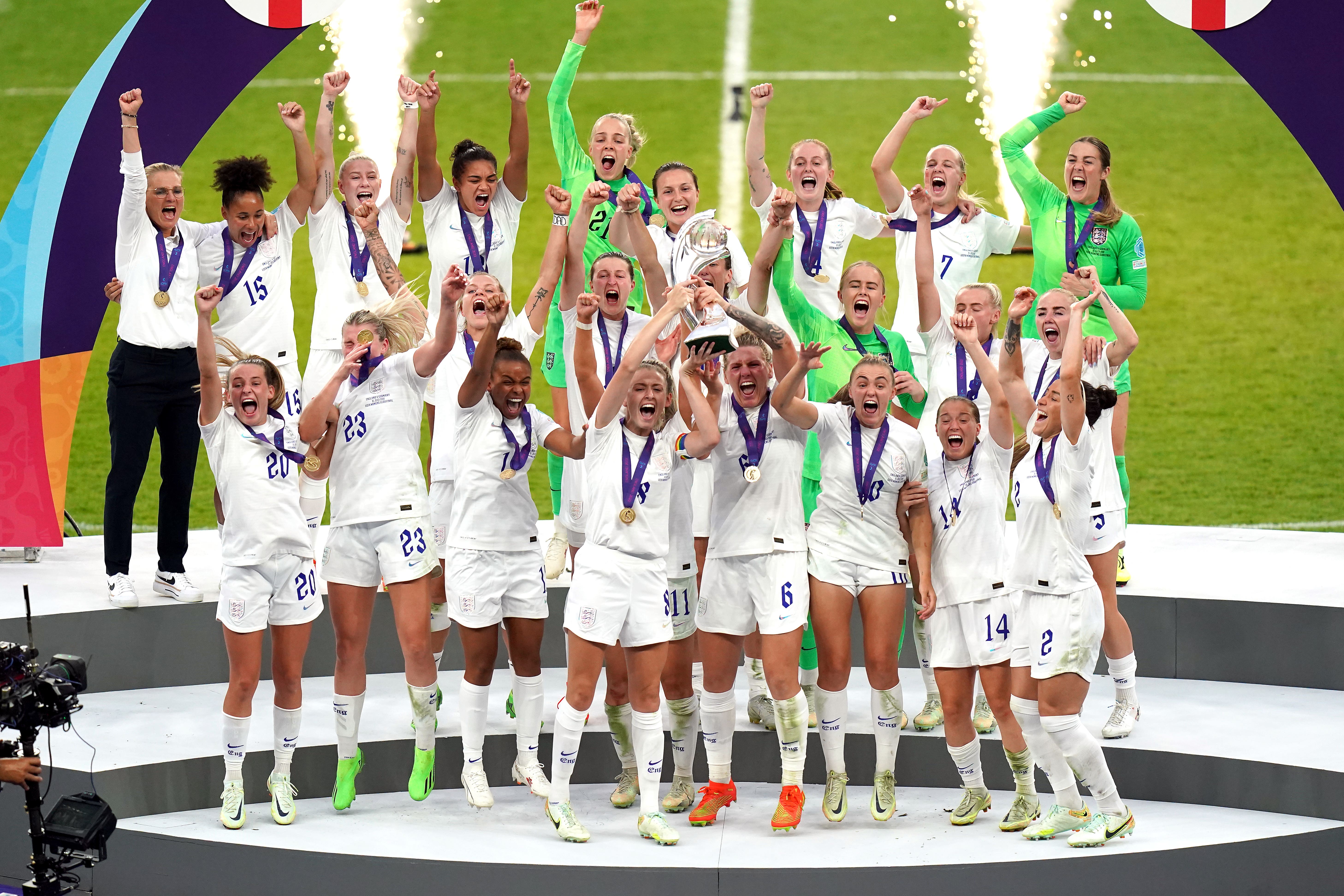Euro glory for Lionesses but England’s men fall short at Qatar World Cup
Victory over Germany at Wembley earned England’s women’s team a first ever major trophy.

An historic triumph during the summer ensured it was a year to remember for England’s Lionesses – but the men’s team were unable to make it a double as 2022 drew to a close.
Expectation on the women’s side was considerable entering July’s home European Championship, with the side having been in impressive, unbeaten form since boss Sarina Wiegman, a champion at the previous edition with her native Netherlands, had taken charge the previous September.
They went on to deliver in sensational style, clinching their first ever major trophy, and the first for a senior England team since the men’s 1966 World Cup success, after Chloe Kelly’s winner secured a 2-1 victory over Germany at Wembley.
Their surge to the final included an 8-0 group-stage thrashing of Norway, coming from behind to beat Spain 2-1 in a dramatic quarter-final thanks to Georgia Stanway’s stunning extra-time strike, and thumping Sweden 4-0 in the semis, with Alessia Russo scoring a superb back-heeled effort.
It was a journey that captivated the nation – the final had an attendance of 87,192, and a peak BBC One audience of 17.4million – as the popularity of English women’s football reached new heights and the likes of Kelly and Golden Boot winner and player of the tournament Beth Mead became household names.
Gareth Southgate’s men looked to add to that success at a winter World Cup in Qatar that had been plagued by controversy, with issues including the treatment of migrant workers and LGBTQ+ rights highlighted.
The team were on a six-match winless run, had lost 4-0 at home to Hungary in June and suffered Nations League relegation in September, but Southgate’s side, having reached the Euro 2020 final the previous year, believed they could go all the way.
Things started well with a 6-2 victory against Iran, and with a 0-0 draw against the United States followed by 3-0 wins over Wales and, in the last 16, Senegal, and players like 19-year-old Jude Bellingham shining, England headed into the quarter-finals looking like genuine contenders.
But a clash with defending champions France proved the end of the road as they were beaten 2-1, captain Harry Kane equalising with a penalty that saw him become his country’s joint-highest scorer, then missing the chance to level again with another spot-kick late on, sending it over the bar.
At both tournaments England were joined in their group by another home nation that exited at that stage. Wales opened their first World Cup campaign in 64 years with a 1-1 draw with the USA before losing to Iran 2-0 and then to England.
Northern Ireland registered their first major tournament goal at the Women’s Euros, scored by Julie Nelson, but were unable to claim a point, beaten 4-1 by Norway, 2-0 by Austria and 5-0 by the hosts.
On the club scene, Pep Guardiola’s Manchester City claimed the Premier League title for a fourth time in five years, finishing a point ahead of a Liverpool outfit who had been in the hunt for a quadruple.
Having beaten Chelsea in both the FA Cup and Carabao Cup finals, Jurgen Klopp’s Reds then had to settle for runners-up finishes in the league and Champions League, losing 1-0 to Real Madrid in the European final.
A turbulent year for Chelsea, who finished third in the league, saw them go through a change of ownership, with American tycoon Todd Boehly buying the club from Roman Abramovich in May, in the wake of Russia’s invasion of Ukraine, and then management as Thomas Tuchel was sacked in September and replaced by Graham Potter.
There was also big change at Manchester United following their sixth-placed finish, with Erik ten Hag brought in as boss over the summer after Ralf Rangnick’s interim spell, and the club in November parting ways with Cristiano Ronaldo by mutual agreement, shortly after the Portugal star had fiercely criticised them in a TV interview.
Antonio Conte’s Tottenham secured the other Champions League berth at the end of 2021-22, while the opening months of this season have seen Mikel Arteta’s Arsenal lead the Premier League table, Eddie Howe’s Newcastle up in the top four, and summer signing Erling Haaland make a scintillating start to life at Manchester City, scoring 23 goals in 18 appearances in all competitions.
In Scotland, Ange Postecoglou oversaw Celtic reclaiming the league title from Rangers, who reached the Europa League final under Giovanni van Bronckhorst, losing on penalties to Eintracht Frankfurt, before sacking the Dutchman last month and naming Michael Beale his successor.
Emma Hayes’ Chelsea won their third successive Women’s Super League title, pipping Arsenal on the final day of the season, and also retained the FA Cup with a 3-2 victory over League Cup winners Manchester City, while Rangers were the women’s league champions north of the border.
Join our commenting forum
Join thought-provoking conversations, follow other Independent readers and see their replies
Comments
Bookmark popover
Removed from bookmarks